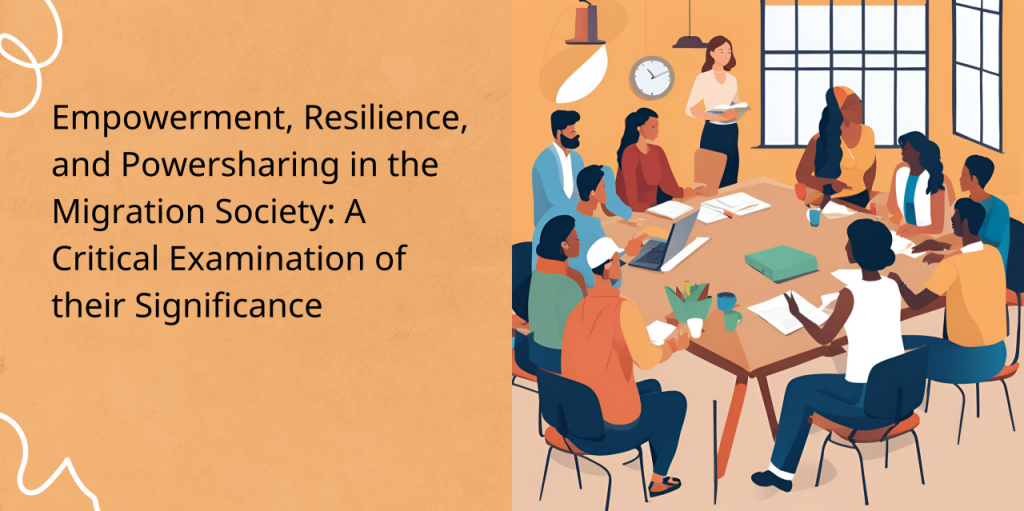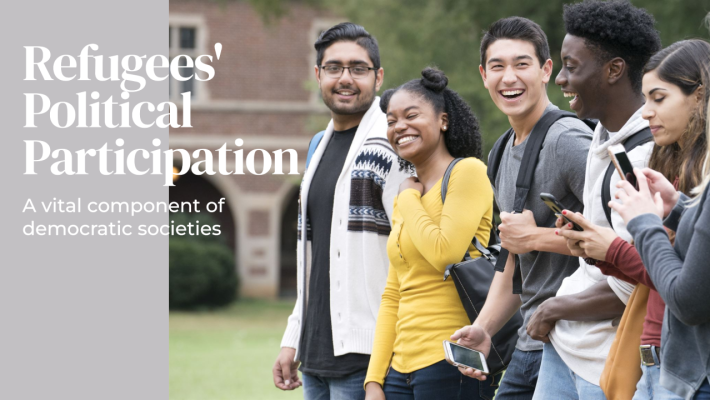Empowerment, Resilience, and Powersharing in the Migration Society: A Critical Examination of their Significance

Introduction
The Federal Republic of Germany is a diverse migration society, characterized by people of different origins, cultures, and life experiences. This diversity holds great potential but also presents challenges. Issues of participation, equality, and dealing with discrimination are central to societal debates. In this context, the concepts of empowerment, resilience, and power sharing have gained increasing importance in recent years. But what do these terms mean? Are they truly keys to a fairer and more inclusive society, or are they merely well-sounding buzzwords without substance? This article examines the theoretical foundations, practical applications, and challenges of these concepts and critically questions their relevance for the migration society.
Empowerment: Self-Empowerment as a Key to Change
Empowerment, which translates to “empowerment” or “strengthening” in German, is a multifaceted concept rooted in social movements such as the Black civil rights movement and feminism. At its core, it aims to enable marginalized groups to recognize, articulate, and assert their own interests. Empowerment seeks to change power relations and give a voice to those who often remain unheard in society.
Theoretical Foundations
Empowerment is not only a theoretical construct but a lived practice that manifests in collective self-organization and political action. It involves creating spaces where marginalized groups can share their experiences, strengthen their identity, and collectively advocate for their rights. Empowerment is a process that occurs both at the individual and collective levels, aiming to change societal structures.
The origins of the term “empowerment” lie in the social movements of the 1960s and 1970s, which aimed to establish political activism to advance the collective interests of marginalized groups. Empowerment was used as a strategy and concept for political self-determination.
Practical Applications
Empowerment takes place in various forms and contexts. In social work, empowerment-oriented approaches are used to support people in difficult life situations and promote their self-determination. In education, it aims to empower young people by providing them with knowledge and skills to shape their future independently. In political work, empowerment encourages marginalized groups to engage politically and represent their interests.
An example of empowerment in practice is the work of migrant self-organizations (MOs). These organizations provide spaces for exchange and networking, support political participation, and advocate for the rights of migrants. They promote self-determination and strengthen the resilience of migrants against discrimination and exclusion.
Challenges and Criticism
Despite the positive aspects of empowerment, there are also critical voices. Some critics point out a dilution of the term, which is often used as a buzzword for various approaches and measures. The individualization and methodization of empowerment are particularly criticized as they shift the focus from structural changes to individual coping strategies.
Another point of criticism concerns the question of who empowers whom and for what purpose. Empowerment processes can also be externally controlled and instrumentalized to achieve specific goals. It is therefore important to critically question who has the power to initiate and shape empowerment processes and what interests are being pursued.
Power Sharing: More Than Just Lip Service?
Power sharing, the sharing of power and privileges, is a concept closely linked to empowerment. It involves privileged groups and institutions sharing their power and resources to enable a fairer distribution of opportunities and participation. Power sharing can manifest at various levels, from political decision-making to the distribution of resources and the design of working and living conditions.
Theoretical Foundations
Power sharing is based on the recognition of power relations and the willingness to change them. It involves reflecting on privileges and taking responsibility for one’s role in maintaining inequalities. Power sharing is a process that requires negotiation and willingness to compromise but also offers the opportunity to develop new forms of collaboration and coexistence.
In the context of migration society, power sharing means that the majority society shares its power and privileges with marginalized groups. This can involve, for example, involving migrant organizations in decision-making processes, distributing resources fairly, and dismantling discriminatory structures.
Practical Applications
In practice, power sharing often takes the form of cooperation and partnerships between various actors. For example, migrant organizations and state institutions can collaborate to promote the participation of migrants and include their perspectives in political decision-making processes. In companies and organizations, power sharing can contribute to creating an inclusive work culture where all employees can realize their potential.
A concrete example of power sharing is the “House of Resources” initiative, which supports volunteer engagement nationwide at various locations. It offers advice, spaces, and financial resources for initiatives and projects that advocate for the rights and participation of migrants.
Challenges and Criticism
Although power sharing is a promising concept, it also faces challenges and criticism. A central problem is the reluctance of many privileged actors to share their positions of power. Often, power sharing is practiced only as lip service, without leading to actual changes in power structures.
Another point of criticism concerns the question of how power can be shared without leading to conflicts and power struggles. Power sharing requires a sensitive approach to different interests and needs and the ability to find compromises. It is therefore important to develop clear rules and procedures for the power-sharing process and ensure that all participants can contribute their voices.
Another aspect is the question of how power sharing can be implemented concretely. Often, it remains unclear which resources should be shared and how the process of power sharing can be designed. Therefore, more concrete examples and recommendations for action are needed for practice.
Resilience: Resilience as a Key to Coping
Resilience, the ability to cope with crises and challenges, is a crucial term in today’s migration society. In the context of racism and discrimination, resilience means resistance to inhumane ideologies and the ability to remain capable of action despite adverse circumstances.
Theoretical Foundations
Resilience is a complex concept with individual and collective aspects. At the individual level, it involves the ability to cope with stress and strains and recover from traumatic experiences. At the collective level, resilience refers to the resistance of communities and societies to crises and challenges.
Psychological resilience research examines protective factors that help people develop positively even under difficult conditions. In addition to personal protective factors such as optimism and self-efficacy, family and social resources also play an important role. Resilience is understood as a dynamic process that develops and changes throughout life.
Practical Applications
Resilience promotion takes place in various areas, from psychosocial counseling to educational work and political action. It involves strengthening people and providing them with resources and strategies to cope with crises and challenges. Resilience promotion can help strengthen mental health, build social networks, and promote political action.
In the context of migration society, resilience plays a special role. People affected by racism and discrimination often face particular challenges. Resilience promotion can help them cope with these challenges and assert their rights.
Challenges and Criticism
The concept of resilience is not free from criticism. Some critics argue that promoting resilience can lead to people being encouraged to adapt to adverse circumstances rather than change them. There is a risk that resilience is misunderstood as an individual responsibility and that structural problems such as discrimination and inequality are overlooked.
Another point of criticism concerns the question of what type of resilience should be promoted. Should it be about maintaining the status quo and adapting to existing power relations, or should resilience serve to change these relations and create a fairer society?
Resilience is an important factor in coping with crises and challenges in migration society. However, it is important to critically reflect on resilience promotion and ensure that it does not lead to adaptation to unjust conditions but contributes to actively shaping a fairer society.
Actors and Networks: Who Advocates for Empowerment, Resilience, and Power Sharing?
Empowerment, resilience, and power sharing are issues that are gaining increasing importance in German society. But who are the actors advocating for these concepts and what networks exist? A look at the landscape of civil society, state institutions, and academia shows a variety of engaged individuals and organizations.
Civil Society Organizations
Civil society is a key actor in promoting empowerment, resilience, and power sharing. Migrant organizations (MOs) and migrant youth self-organizations (MYSOs) play a special role. Examples include:
- Tutmonde e.V. (Stralsund): This organization advocates for the empowerment of girls and women with migration and refugee backgrounds and actively engages against discrimination and for a democratic society.
- Coach e.V. (Cologne): This initiative promotes educational justice and equal opportunities for young people with migration backgrounds. It offers empowerment-oriented educational programs, counseling, and support for implementing their own projects.
- Amaro Drom e.V. (Federal Association): This youth organization advocates for the rights of young Romnja and Sintizze and promotes empowerment, mobilization, and self-organization.
Umbrella Organizations and Networks
Umbrella organizations and networks support the work of individual organizations and represent their interests at the political level. They promote exchange and cooperation between various actors, thus strengthening civil society. Examples include:
- DaMOst: The umbrella organization of migrant organizations in East Germany represents over 300 MOs and advocates for the interests of the population with migration backgrounds living in East Germany.
- DaMigra: The umbrella organization of migrant women organizations represents 71 MOs nationwide and advocates for equal political, social, professional, and cultural participation of migrant women.
Organizations with a Focus on Empowerment/Resilience
In addition to migrant organizations, there are also many other organizations advocating for empowerment and resilience. These include anti-discrimination offices, educational institutions, and initiatives that advocate for the rights of marginalized groups and offer empowerment-oriented programs.
An example is the Anti-Discrimination Office Cologne (ADB Cologne), which offers not only counseling services but also empowerment workshops for various target groups.
Foundations and Academia
Foundations such as the Amadeu Antonio Foundation and the Heinrich Böll Foundation promote projects and initiatives that advocate for empowerment, resilience, and power sharing. They support civil society’s work and offer platforms for exchange and further education.
In academia, empowerment, resilience, and power sharing are researched and taught at various universities and research institutes. Studies and publications provide important insights and recommendations for action for practice.
State Institutions
State institutions such as the Federal Agency for Civic Education (BpB) and the Federal Anti-Discrimination Agency (ADS) also advocate for empowerment, resilience, and power sharing. They offer educational programs, counseling services, and funding for civil society projects.
An example is the Federal Anti-Discrimination Agency, which supports empowerment-oriented projects and initiatives and advocates for the enforcement of anti-discrimination laws.
Conclusion: Empowerment, Resilience, and Powersharing – Keys to a Just Future?
Empowerment, resilience, and powersharing are undoubtedly important concepts for a just and inclusive migration society. They offer strategies and courses of action to reduce discrimination and exclusion, enable participation, and shape a diverse society.
The present study has shown that these concepts are already being applied in practice and are supported by a variety of actors. Migrant organizations, youth associations, anti-discrimination offices, educational institutions, research institutions, foundations, and state institutions are all committed to empowerment, resilience, and powersharing in different ways.
Empowerment enables marginalized groups to find their voice and represent their interests in a self-determined way. Resilience strengthens the ability to resist discrimination and exclusion and promotes the ability to cope with crises and challenges. Powersharing focuses on changing power relations and the fair distribution of resources and opportunities.
However, the study has also shown that the implementation of these concepts is associated with challenges. It requires a critical examination of power relations, a willingness to share resources, and a recognition of the diverse realities of all people. In particular, the institutional anchoring of powersharing is often difficult, as privileged actors do not want to give up their power positions without further ado.
Nevertheless, empowerment, resilience, and powersharing offer important perspectives for a fairer and more inclusive future. They are not just buzzwords but lived practices that can help overcome the challenges of the migration society. It is up to all of us to further develop these concepts, promote their implementation, and work together for a society in which all people can participate equally.
The future of the migration society depends on whether we are willing to take on these challenges and work together for a more just society. Empowerment, resilience, and powersharing are important keys that can help us achieve this goal. It is time to stop using these concepts as mere buzzwords and instead translate them into concrete actions, thus shaping a future where all people have the opportunity to develop their potential and lead a self-determined life.

